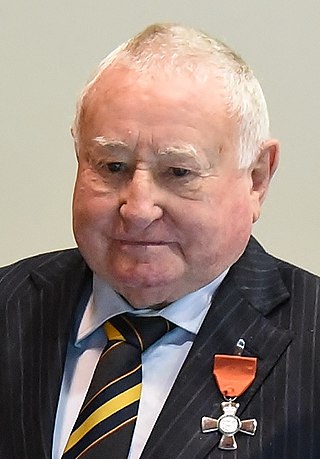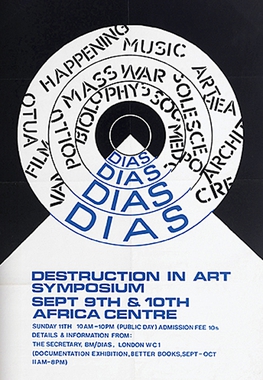Related Research Articles
Viennese Actionism was a short-lived art movement in the late 20th-century that spanned the 1960s into the 1970s. It is regarded as part of the independent efforts made during the 1960s to develop the issues of performance art, Fluxus, happening, action painting, and body art. Its main participants were Günter Brus, Otto Mühl, Hermann Nitsch, and Rudolf Schwarzkogler. Others involved in the movement include Anni Brus, Heinz Cibulka and Valie Export. Many of the Actionists have continued their artistic work independently of Viennese Actionism movement.

Hermann Nitsch was an Austrian contemporary artist and composer. His art encompassed wide-scale performances incorporating theater, multimedia, rituals and acted violence. He was a leading figure of Viennese Actionism.

Peter Weibel was an Austrian post-conceptual artist, curator, and new media theoretician. He started out in 1964 as a visual poet, then later moved from the page to the screen within the sense of post-structuralist methodology. His work includes virtual reality and other digital art forms. From 1999 he was the director of the ZKM Center for Art and Media Karlsruhe.
Otto Muehl was an Austrian artist, who was known as one of the co-founders as well as a main participant of Viennese Actionism and for founding the Friedrichshof Commune.

Barry Whitley Sinclair was a New Zealand cricketer. He played 21 Test matches for New Zealand national team as a specialist batsman from 1962–63 to 1967–68, and captained the team from 1966 to 1968.
Günter Brus was an Austrian painter, performance artist, graphic artist, experimental filmmaker, and writer.
Rudolf Schwarzkogler was an Austrian performance artist closely associated with the Viennese Actionism group that included artists Günter Brus, Otto Mühl, and Hermann Nitsch.

Kurt Schwertsik is an Austrian contemporary composer. He is known for creating the "Third Viennese School" and spreading contemporary classical music.
The Szondi test is a 1935 nonverbal projective personality test developed by Léopold Szondi. It has been rated by mental health professionals as one of the top five most discredited psychological tests.

The Destruction in Art Symposium was a gathering of a diverse group of international artists, poets, and scientists to London from 9–12 September, 1966. Included in this number were representatives of Fluxus and other counter-cultural artistic undergrounds who were there to speak out on the theme of destruction in art.

The Vancouver Canucks were a minor league professional ice hockey team in the Pacific Coast Hockey League and the Western Hockey League, based in Vancouver, British Columbia, Canada. Inaugurated in 1945 with the PCHL, they became a WHL team with the merger of the PCHL with the Western Canada Senior Hockey League in 1952. The Canucks played 25 seasons in the WHL between 1945 and 1970. In 1970 they joined the National Hockey League along with fellow expansion team, the Buffalo Sabres.

Razorcake is a 501(c)(3) non-profit organization that publishes the Razorcake fanzine, a DIY punk rock fanzine published bi-monthly out of Los Angeles, California. It was co-founded by Todd Taylor and Sean Carswell in 2001.

Clubul Sportiv Rapid București is a Romanian multi-sport club based in Bucharest, Romania.
Zdzisław Wysocki is a Polish composer, born in 1944 in Poznań (Posen).
Sadanand Namdeo Mohol was an Indian medium-fast bowler who played first-class cricket in India from 1960 to 1971. He toured England with the Indian team in 1967, but did not play Test cricket.